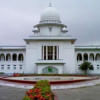Eviction outside camps legal
The High Court yesterday upheld a government decision to evict Urdu-speaking people who live outside their designated camps, from government land.
It also ordered the government to rehabilitate any evicted person, who has national identity card and is loyal to Bangladesh, as soon as possible.
The HC bench of Justice Md Moinul Islam Chowdhury and Justice JBM Hassan gave the verdict, hearing nine writ petitions challenging the eviction move.
However, the grounds on which the verdict was delivered could not be known immediately as its copy was not released.
Some Urdu speaking people and Odhikar, a rights organisation, filed the petitions at different times between 2001 and 2011.
Seven lakh Urdu speakers live in and outside 116 camps across the country, and approximately 90 percent of them have the national ID card, Sadakat Khan, one of the petitioners, told The Daily Star yesterday.
Around three lakh of them live outside the camps, said Khan, who is also the president of Urdu Speaking Peoples Youth Rehabilitation Movement.
He said the people would suffer a lot if the government evicted them without ensuring their rehabilitation.
Sadakat claimed that the Urdu-speaking people owned houses and land before the Liberation War in 1971 but the government and the Red Crescent moved them to the camps after the war.
Mahmuda Parveen Poppy, assistant attorney general, said many of the Urdu-speaking people had been staying outside their camps, illegally occupying the land of the National Housing Authority (NHA) in different areas of Dhaka and on lands of Bangladesh Railway in Saidpur and Nilphamari.
She said the NHA could not hand over allotted plots because of the illegal occupants.
Mahmuda also said the government has a plan to rehabilitate Dhaka's Mirpur camp residents to Savar. She said they had submitted a letter about the plan to the HC during the hearing.
The court has not issued any directive on the Urdu-speaking people who do not have the national ID cards, she added.
Hafizur Rahman Khan, a lawyer for two other writ petitioners, told The Daily Star that the HC yesterday has also withdrawn its earlier orders that restrained the government from evicting the illegal occupants of government land across the country.
Following the petitions, the court had also issued nine separate rules questioning the legality of the government actions aimed at the eviction. The court discharged the rules yesterday, he said.
The government can now again start the eviction of the Urdu-speaking occupants of government land, he said.

 For all latest news, follow The Daily Star's Google News channel.
For all latest news, follow The Daily Star's Google News channel. 







Comments